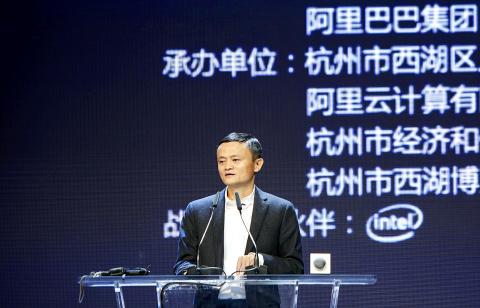Foxconn Technology Group (富士康) and Alibaba Group Holding Ltd (阿里巴巴) yesterday jointly announced a plan to build a start-up incubation base in Hangzhou, China, with the Taiwanese firm to assist start-ups with hardware production and the Chinese company providing cloud-computing services.
“You [start-ups] have a chance to succeed because the environment, infrastructure and the financing resources are far better than 15 years ago,” Alibaba chairman Jack Ma (馬雲) said at the opening of the the Hangzhou YunQi Conference, which was broadcast over the Internet.
More than 3,000 tech start-ups with more than 20,000 developers registered for the two-day cloud-computing conference, according to event organizer, Aibaba’s cloud-unit, Aliyun (阿里雲).

Photo: Bloomberg
Aliyun president Hu Xiaoming (胡曉明) said Alibaba is willing to share its cloud-computing, big-data technologies, third-party payment and logistics with people who are planning to start their own business.
Alexus Chou (周正皓), who is in charge of the incubator program on behalf of Foxconn, said the company has been investing in Hangzhou for more than a decade and now the firm wishes to pave a path for start-ups to be successful.
Chou said the incubator program integrates resources provided by Foxconn, Alibaba, YunQi Cloud Town (雲棲小鎮) and ZBJ Network Inc (豬八戒網).
YunQi Tech Town is a cooperation inked between Foxconn and the Hangzhou City Government in March this year.
According to the agreement, the Taiwanese firm is to help the Hangzhou government build a software and hardware high-tech base in the city.
Chou said more than 300 start-ups visited YunQi Tech Town over the past few months, when the incubator program was still in its trial period.
So far, more than 120 companies have acquired resources for their business, he said.
Foxconn vice president Jacob Chen (陳振國) said the company plans to build a friendly environment so anyone who has creative ideas can join the program.
Chou said Foxconn will assist start-ups to produce sample products, provide supply chains options and manufacture a small amount of products.
In addition, the company is to provide consultation on patent-related matters, he said.
“The program provides a one-stop service for start-ups to manufacture products and deliver goods to consumers,” Chou said.
Apart from the start-up program, the two companies also unveiled enhanced security for data communications through “quantum cryptography,” according to an e-mailed statement.

Taiwanese suppliers to Taiwan Semiconductor Manufacturing Co. (TSMC, 台積電) are expected to follow the contract chipmaker’s step to invest in the US, but their relocation may be seven to eight years away, Minister of Economic Affairs J.W. Kuo (郭智輝) said yesterday. When asked by opposition Chinese Nationalist Party (KMT) Legislator Niu Hsu-ting (牛煦庭) in the legislature about growing concerns that TSMC’s huge investments in the US will prompt its suppliers to follow suit, Kuo said based on the chipmaker’s current limited production volume, it is unlikely to lead its supply chain to go there for now. “Unless TSMC completes its planned six

Intel Corp has named Tasha Chuang (莊蓓瑜) to lead Intel Taiwan in a bid to reinforce relations between the company and its Taiwanese partners. The appointment of Chuang as general manager for Intel Taiwan takes effect on Thursday, the firm said in a statement yesterday. Chuang is to lead her team in Taiwan to pursue product development and sales growth in an effort to reinforce the company’s ties with its partners and clients, Intel said. Chuang was previously in charge of managing Intel’s ties with leading Taiwanese PC brand Asustek Computer Inc (華碩), which included helping Asustek strengthen its global businesses, the company

Power supply and electronic components maker Delta Electronics Inc (台達電) yesterday said second-quarter revenue is expected to surpass the first quarter, which rose 30 percent year-on-year to NT$118.92 billion (US$3.71 billion). Revenue this quarter is likely to grow, as US clients have front-loaded orders ahead of US President Donald Trump’s planned tariffs on Taiwanese goods, Delta chairman Ping Cheng (鄭平) said at an earnings conference in Taipei, referring to the 90-day pause in tariff implementation Trump announced on April 9. While situations in the third and fourth quarters remain unclear, “We will not halt our long-term deployments and do not plan to

The New Taiwan dollar and Taiwanese stocks surged on signs that trade tensions between the world’s top two economies might start easing and as US tech earnings boosted the outlook of the nation’s semiconductor exports. The NT dollar strengthened as much as 3.8 percent versus the US dollar to 30.815, the biggest intraday gain since January 2011, closing at NT$31.064. The benchmark TAIEX jumped 2.73 percent to outperform the region’s equity gauges. Outlook for global trade improved after China said it is assessing possible trade talks with the US, providing a boost for the nation’s currency and shares. As the NT dollar